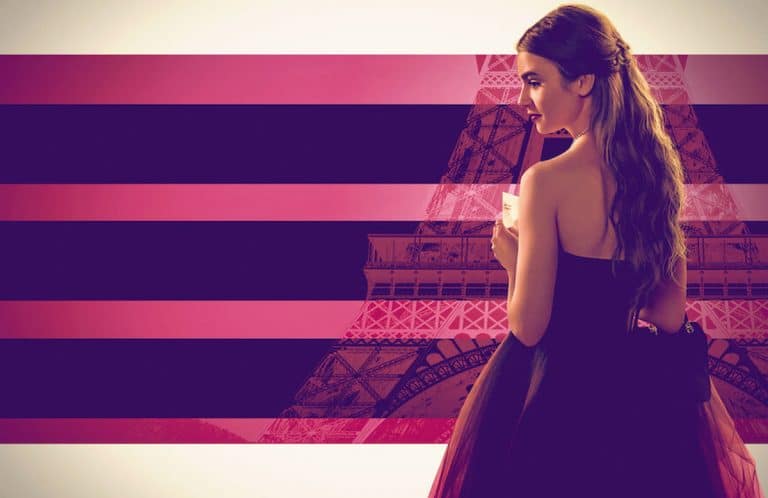Here’s why ‘Emily In Paris’ got two Golden Globe nominations: corruption

Remember when the shitshow—pardon my French—that is Emily in Paris received not one but two Golden Globe nominations at the beginning of February? I know you do, and you’re most definitely still raging about the fact that Michaela Coel’s I May Destroy You got zero. Even a writer on Emily in Paris said the latter deserved a Golden Globe nomination! At that time, we all wondered what the heck was wrong with the Golden Globe Awards. Well, we now have a worrying answer: corruption.
According to a report from The Los Angeles Times, over 30 members of the Hollywood Foreign Press Association (HFPA, the voting body that determines the Golden Globe nominees) were flown to Paris by Paramount to visit the set of Emily in Paris. They stayed for two nights at the five-star Peninsula Paris hotel, where rooms cost around $1,400 a night. There was also a news conference and a lunch at the Musée des Arts Forains, a private museum where the series was being filmed.
“They treated us like kings and queens,” one member who participated in the trip said. While HFPA rules forbid members from accepting gifts valued at over $125 for each project, there are clearly workarounds that have been exploited. The Emily in Paris ‘experience’ being one, and the opportunity to take a selfie with an A-lister being another, corruption seems to run deep.
The Los Angeles Times first launched this investigation in wake of the lawsuit from Norwegian journalist Kjersti Flaa against the HFPA after being denied membership. Flaa accused the organisation of being a “culture of corruption” that operated like a cartel where members would receive “thousands of dollars in emoluments” from studios and networks while sticking to a “code of silence.” However, a judge ruled in favour of the HFPA, explaining that Flaa didn’t suffer economic or professional hardship as a result of her membership denial.
Following the judge’s dismissal, HFPA attorney Marvin Putnam of Latham & Watkins said that the group had been vindicated, calling the suit nothing more than “a transparent attempt to shake down the HFPA based on jealousy, not merit.”
Within the HFPA, however, Flaa’s suit had struck a nerve with some members who had hoped it might force the organisation to make, what they see as long-overdue, changes. “The dismissal was disappointing,” said one current HFPA member, who like many quoted in the Los Angeles Times article declined to be identified out of fear of retaliation from others in the group. “I thought it would shake things up. We are an archaic organisation. I still think the HFPA needs outside pressure to change,” they added.
The investigation further found that the HFPA regularly sends out payments to its members, a practice that experts believe could go against IRS guidelines. Individuals have reportedly received nearly $2 million for serving on various committees and performing other tasks.
Over its nearly eight-decade history, the HFPA has been the centre of a string of embarrassing scandals, lawsuits and often blistering criticism of its membership. The group has been the butt of jokes even from the stage of its own awards show. Hosting in 2016, Ricky Gervais dismissed the Golden Globe Awards as “worthless,” calling the ceremony “a bit of metal that some nice old confused journalists wanted to give you in person so they could meet you and have a selfie with you.” In a 2014 interview, actor Gary Oldman said the group was “90 nobodies having a wank” and called for a boycott of the “silly game” their awards represent.
In the run-up to the 78th Golden Globe Awards ceremony planned to run on 28 February, questions persist around the association’s legitimacy, the qualifications of its members and its ethics. “Interviews with more than 50 people — including studio publicists, entertainment executives and seven current and former members — as well as court filings and internal financial documents and communications, paint a picture of an embattled organization still struggling to shake its reputation as a group whose awards or nominations can be influenced with expensive junkets and publicity swag,” writes The Los Angeles Times.
The HFPA has faced further criticism for this year’s nominations, which did not include several Black-led Oscar contenders such as Da 5 Bloods, Ma Rainey’s Black Bottom, Judas and the Black Messiah and I May Destroy You. Several other picks bewildered critics, including a best motion picture nod in the comedy or musical category for pop star Sia’s widely criticised directorial debut Music.
“We do not control the individual votes of our members…we seek to build cultural understanding through film and TV and recognise how the power of creative storytelling can educate people around the world to issues of race, representation, and orientation,” an HFPA spokesperson said in a statement.





